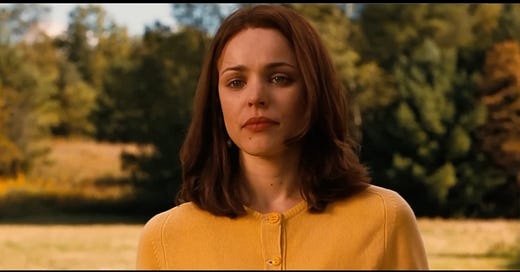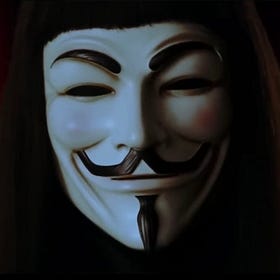Marketing and Movies: The Time Traveler's Wife
A love story, interrupted. Over and over again.
Happy Tuesday, y’all! Please Like and Restack this issue to help increase its visibility on Substack. Thank you! And if you haven’t already, please consider subscribing to Backstage Pass. Free subscribers get access to each new article as it comes out, for the first month. After one month, each article goes behind a paywall for free subscribers. Paid subscribers have access to all Backstage Pass content, with no paywalls.
A Love Story, Interrupted. Over and Over Again.
Today I am going to review the movie The Time Traveler’s Wife. This article will be a review of the movie, as well as some marketing lessons we can take from the film. As such, it will have a LOT of spoilers, so please watch the film before reading, if you haven’t already.
The Time Traveler’s Wife is a movie that I would normally never watch. Prior, I had never seen a movie with either of the lead actors; Rachel McAdams or Eric Bana. And in general, I am not a fan of science fiction movies. Plus, the title and supporting imagery for the film just screamed romantic drama to me, and that’s not my cup of tea. For whatever reason, I decided to take a chance on The Time Traveler’s Wife, and I was rewarded with one of the most enjoyable movies I have watched in a very long time.
The basic premise is that the movie follows the life of husband and wife Henry and Clare, as they struggle to deal with Henry’s unpredictable time-traveling that’s a result of an extremely rare genetic condition. That gives the movie it’s ‘hook’, in that Henry time-travels, but has no control over it. So we as the audience watch how Henry’s condition affects himself and everyone he comes in contact with.
The person that bears the brunt of the burden for Henry’s condition is his wife, Clare, played by Rachel McAdams. Clare first meets Henry when Clare is 6 years old, thanks to a random time-jump by Henry. Clare is immediately smitten with Henry, and over the course of her preteen and teenage years, older Henry comes back to meet younger Clare several times. Each time, Clare’s affection for Henry only grows, so that she spends the remainder of the movie hopelessly in love and completely devoted to Henry. Which sets up the often tragic plot of watching Clare constantly deal with the literal love of her life disappearing without any warning. The emotional jarring we watch Clare endure each time this happens begins to weigh on us as heavily as it does on Clare by the film’s end.
Rachel McAdams’ performance as Clare Abshire carries this movie to a place that it likely doesn’t deserve to otherwise see. Clare’s character is a familiar one, even if the setting of being the spouse of a time-traveler is not. Clare is the long-suffering wife who the audience is supposed to feel growing sympathy for as the movie progresses.
We watch as Clare grows and is aged emotionally by the circumstances in which she finds herself. McAdams brilliantly portrays Clare’s struggle through the years to stay connected to a man that could leave her at any moment. When we first see Clare in the library at the start of the movie, she is innocent, beaming with carefree happiness and joy. Yet by the final scene, the emotional whiplash of spending years delighting in the unexpected arrival of her husband, then having to deal with his equally abrupt disappearance has clearly taken its toll on Clare. Her natural beauty continues to radiate, but the youthful exuberance of a life lived waiting for Henry has given way to the constant disappointment of him unexpectedly leaving her. Again and again.
I was so taken by Clare that I decided to watch The Time Traveler’s Wife multiple times. What I noticed in subsequent viewings was a depth in other characters that I had totally missed in my first viewing.
First, I was drawn to the growth of Alba; Clare and Henry’s daughter. Alba quickly grows into the role of emotional caregiver for her father, mother, and even herself. Alba has inherited the genetic anomaly from Henry that allows for time travel, but unlike Henry, Alba has limited ability to control where and when she leaves and returns.
In the process of learning to hone her time-traveling ability, Alba focuses on connecting with her younger self. In fact, Alba reveals to her younger self that Henry dies when she is 5 years-old, a fact that was unknown to Clare at the time. Alba then continues to re-connect with her younger self, helping her deal with the grief of losing her dad. Additionally, Alba goes to great lengths to comfort Clare not only with the loss of Henry from his death, but the continual leaving she experiences as Henry repeatedly travels back to her from the past. The movie ends with Alba and Clare consoling each other after another unexpected departure by Henry. In fact, the ending seems to suggest to the audience that the remainder of this story will be more about the love between daughter and mother moreso than husband and wife.
And then there is Henry. As my affection for Clare grew from watching The Time Traveler’s Wife repeatedly, I found myself being more critical of Henry’s actions, especially toward Clare. Throughout the film, we see how Henry displays affection for his father, his mother, his friends and his daughter Alba. And although Henry clearly cares for Clare, there is also a very distinct disconnect between how Clare displays affection for Henry as opposed to how Henry does for Clare.
While Clare loves Henry completely and unconditionally, Henry seems to always view Clare as the same 6 year-old girl he first met in the family meadow at the start of the film. As Clare spends the entire film desperately trying to comfort Henry, the moments where Henry seems to genuinely care about Clare’s feelings more than his own are so rare that they stand out. Henry seems to spend the majority of the film self-absorbed in the problems that his time travel is creating for himself, while often overlooking the stress it causes to Clare and later Alba. In one scene, Clare and Henry have a rare fight:
Clare: “You think I wanted this life? This husband that disappears without any kind of warning? Do you think anyone would want that? Who would want that?”
Henry: “You have a choice!”
Clare: “I never had a choice.”
Perhaps that’s the key question the movie poses to the audience: Would you rather have Clare’s life, or your own? Would you choose a life with someone that you completely loved, even if you never knew how long you would have with them? Clare’s life is like a butterfly in the breeze. It lights on a spot, but never stays there for very long. Joy falls on Clare, and just as she begins to bathe in its happiness, the joy departs, leaving loneliness to fill the space it occupied. Then just as loneliness begins to tempt depression, joy returns, and then leaves again just as unexpectedly. The emotional highs and lows perhaps aren’t as severe, but the wear and tear on the soul would have to be accounted for.
Marketing and Movies: V for Vendetta
Happy Monday, y’all! While you are thinking about it, please click the Like button for me. It will help raise visibility of this issue on Substack. Thank you!
When watching The Time Traveler’s Wife, I suspect the director wanted us to consider if we could live a life where our love was constantly leaving us with no warning. Could we deal with the emotional stress this would cause? Would the joy be worth the pain?
That may very well have been the director’s intent. But when The Time Traveler’s Wife ended, I couldn’t help but wonder instead what it would be like to live a life with a partner as devoted and loving as Clare. Again, I don’t think the director was leading in that direction, but Rachel McAdams did such an amazing job with developing the Clare Abshire character that she forced me to that endpoint.
What are the marketing lessons we can take from The Time Traveler’s Wife?
One of the common themes we explore in Backstage Pass is the power of tapping your customers to spread your marketing. The reason why is simple: Your happy customers love you and want to see your business succeed. Happy customers have a passion for seeing your business succeed that spurs them on to do their best to help you grow.
Likewise, it turns out Rachel McAdams channeled her passion for the character of Clare into her performance in The Time Traveler’s Wife:
"I had read the book and dreamed of playing Clare for a while, and it was such a long time before it actually happened," Rachel recently said. "I just fell madly in love with (the book) and knew at the back of my mind that they were doing a movie…and I just waited. Hoping."
I believe this is why Rachel did such an amazing job in portraying Clare. It’s obvious she loves the character and wants us to understand who Clare is at her core. I suspect we wouldn’t have seen such a powerful performance if Clare Abshire’s character had been entrusted to an actor who wasn’t already a devoted fan of Clare and the book The Time Traveler’s Wife.
The second key marketing lesson we can take from The Time Traveler’s Wife is the power of differentiation. How do you make a movie about time travel stand out? You give the movie a unique perspective: The time traveler cannot control his ability. In most movies that focus on time travel, the ability is viewed as a gift that the time-traveler leverages to improve their life. But for Henry, it’s a curse, as he has no control over when he will travel, or where he will go. This adds a layer to the story that similar time-traveling movies don’t have. We also get to explore how Henry’s friends and family deal with his condition. These elements add depth to the story and give The Time Traveler’s Wife a way to stand out. The fact that the movie’s description said Henry couldn’t control his jumps was ultimately what sold me on watching it in the first place.
And I’m so glad I did. The Time Traveler’s Wife was an unexpected joy.
Thank you for reading this edition of Marketing and Movies. Next month’s edition will feature The Book of Eli. If you’re a fan of Denzel Washington, this movie is a bit different from most of his other performances. But the story is just as powerful, and it’s a wonderful film which is well worth your time.
On Thursday, I’ll have the second edition of Marketing and Music, featuring how Johnny Cash’s groundbreaking 1968 concert at Folsom Prison came to be. It’s a wonderful story that has many surprising elements along the way.
Have a great Tuesday, please remember to Like and Restack this post. Thank you!
Mack






Mack, this is such a beautifully layered take on The Time Traveler’s Wife. Your analysis of Clare’s character struck a chord—her resilience and devotion are as inspiring as they are heartbreaking. It’s amazing how Rachel McAdams’ passion for the role elevated the entire story.
Your connection to marketing is spot on, too—true differentiation isn’t just about standing out; it’s about creating depth and emotional connection, whether in storytelling or business. Excited to see how you explore The Book of Eli next!
This is a wonderful movie, full of intrigue! I love how you spun the take-. Like the movie you leveraged an unexpected, plot twist with marketing finesse. :)